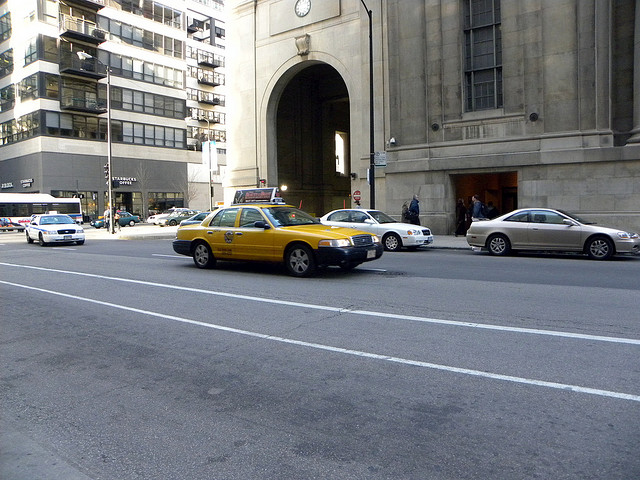City Council Passes Controversial But Watered-Down Rideshare Ordinance
By Stephen Gossett in News on Jun 22, 2016 6:40PM

Photo credit:
After much political wrangling and many different revisions, a much-debated new rideshare ordinance was approved Wednesday by the City Council, 36-12.
The most contentious point, a requirement that drivers be fingerprinted, did not make it into the measure. Instead, a task force will study the issue for six months then present its findings. Like much of the debate leading up to the vote, the Council meeting was not without political spectacle, as Mayor Rahm Emanuel at one point threatened to adjourn the meeting after Ald. Scott Waguespack attempted to delay the vote.
Ald. Anthony Beale, who led the charge for tighter regulation, voted for the measure—which was significantly diluted from when it was originally proposed. A previous iteration would have required at least five percent of rideshare fleets offer disability services before it was watered down. Under the new ordinance, Uber and Lyft will have one year to develop and instate a plan that hits that requirement.
Chelsea Wilson, senior policy communications manager for Lyft, shared a statement with Chicagoist regarding the ordinance: "We received the revised ordinance language this morning and are in the process of reviewing the changes. We appreciate the dedicated efforts of Mayor Emanuel, Alderman Beale and the entire City Council to find a way forward that keeps ridesharing available for people in Chicago."
The rideshare giants had previously threatened to pull out of the city if the Council went through with the vote. While both companies no longer operate in Austin, TX due to municipal laws, it seems unlikely that they would pull out of Chicago, the third largest city in the country with nearly three million people. Despite Uber having billions in cash on hand, such a move would likely have a real impact the company's bottom line. The move to pull out of Austin has been criticized for allowing competition to creep in while at the same time not generating much public outcry.
Meanwhile, the American Federation of State, County and Municipal Employees—which represents the taxi industry—is very clear about its displeasure. Dave Kreisman, an AFSCME communications rep, issued this statement to Chicagoist:
“While Mayor Emanuel and other supporters of the substitute ‘Rideshare Reform Ordinance’ proclaim it to be a compromise made with coalition partners, nothing could be further from the truth.The core principles we sought in the original ordinance were access, fair rules, and safety, all of which have been discarded completely. Public safety demands all of Chicago’s for hire drivers be appropriately vetted by the City of Chicago, yet the ordinance passed continues to allow rideshare companies to self-police, which has repeatedly proven to be insufficient in light of dozens of cases of violent criminals slipping through Uber’s internal background check.
This ordinance does nothing to address the competitive disadvantage created by this administration in its two-tiered regulatory system that has destroyed family supporting jobs in the transportation industry and bankrupted thousands of hard working Chicago cab drivers."
Update, 2:30pm:
Uber spokeswoman Brooke Anderson has thrown water on the pull-out threat. She issued the following statement to Chicagoist:
"Over the past several months, hundreds of thousands of Chicagoans urged the City Council to protect ridesharing in their neighborhoods. Thanks to Mayor Rahm Emanuel's leadership and good faith efforts by many aldermen, their voices were heard today. While not perfect, we believe this compromise will preserve ridesharing and ensure drivers can continue to serve every neighborhood in Chicago."